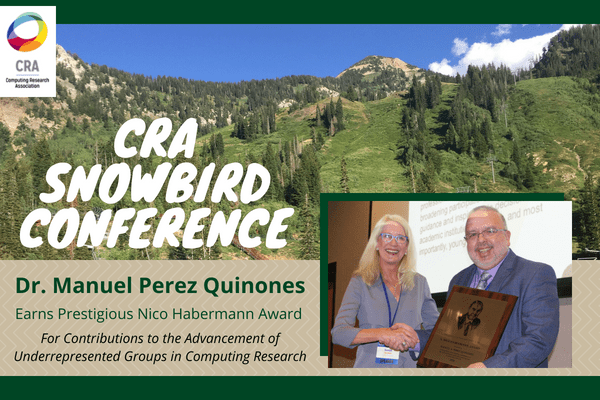Dr. Manuel Pérez Quiñones Wins Prestigious Nico Habermann Award

At the biennial Computing Research Association (CRA) Conference, Dr. Manuel Pérez Quiñones was honored as the recipient of the Nico Habermann Award.
The CRA Conference, held at Snowbird Resort in Utah, is the flagship invitation-only conference for the leadership of the North American computing research community.
Founded in 1972, CRA’s membership includes more than 200 North American organizations active in computing research: academic departments of computer science, information, and computer engineering, laboratories and centers (industry, government, and academia), and affiliated professional societies (AAAI, ACM, CACS/AIC, IEEE Computer Society, SIAM, USENIX).
The award, given in honor of the late Nico Habermann, who headed NSF’s Computer and Information Science and Engineering Directorate and who was deeply committed to increasing the participation of women and underrepresented minorities in computing research.
CRA bestows the award to a person who has made outstanding contributions aimed at increasing the numbers and/or successes of underrepresented members in the computing research community.
Pérez-Quiñones was nominated by his former colleague at Virginia Tech, Dr. Barbara Ryder.
In her nomination, she wrote, “…[His] passion about inclusion has driven his leadership of campus, state and nationwide efforts to diversify computing. He has made concrete, disseminated contributions to diversity education at the high school and college levels. He personally ‘walks the talk’ at conferences, panels, and in the classroom. I am proud that our
computing profession has such an able, organized and determined advocate for diversity and inclusion.”
“It is humbling to be included on the same list as previous winners of this recognition,” Pérez-Quiñones says. “Many previous winners have been mentors for me and encouraged me to be involved in these types of activities.
“Personally, the award means that my efforts are being recognized for making a difference. My work in encouraging participation from underrepresented groups is work that is done in the interest of serving others and with the goal of opening doors to people who might not get similar opportunities or don’t see themselves in our community (computing). It is an affirmation that this work is important.”
Pérez-Quiñones has effectively led diversity efforts by computing professional societies such as the Coalition to Diversify Computing (CDC) and the Center for Minorities and People with Disabilities in Information Technology (CMD-IT). Pérez Quiñones has also contributed to educational programs aimed at high school through graduate school educators, such as CS@VT High School Teachers’ workshops (which led to ACM CSTA chapters across the state), and the NCWIT Pacesetters program. Further, he has given talks and served on panels to increase public awareness of the need to greatly increase the numbers of Latino/a students and professionals in computing. He has advised ten Ph.D. students and 14 Master’s students, and he has served on more than 20 Ph.D. committees and 50 student committees.
His history of diversity leadership through professional service is unparalleled. Pérez Quiñones founded and contributed to significant efforts, including the Virginia Latino Higher Education Network (VALHEN), the UNCC CCI Corporate Mentoring Program for Women in Computing, the Tapia Conference (program co-chair in 2009 and 2014), SIGCSE, CRA-W Collaborative Research Experiences for Undergraduates (CREU; co-chair from 2006-2010), CRA Center for Evaluating the Research Pipeline (CERP; advisory board from 2014-2015), and the Hispanic mailing list that supports Hispanic Ph.D. students and faculty.
He has received three NSF Broadening Participation in Computing Alliance grants. His workshops on inclusion, identity, and belonging has influenced change in the academic computing culture by bringing forward challenges and strategies to those who have the most influence on students and the departmental/classroom culture (e.g., teachers, faculty, and graduate students). Through his work in broadening participation, he has provided guidance and inspiration to decision makers, academic institutions, industry, and most importantly, young students.
Pérez-Quiñones is proud of the relatively diverse student population at CCI, but his work will continue as the College seeks to be defined as a place of inclusion and opportunity for Computer Science students from underrepresented populations.
“Increasing representation of women and students from underrepresented groups is one of the strategic goals of our College,” he says. “This recognition simply says that our strategic goal is important and that we have the right team in place that can help lead the efforts.”
For more on the Computing Research Association, visit cra.org
For More News, Notes and Updates, Follow Us on Twitter @UNCC_CCI